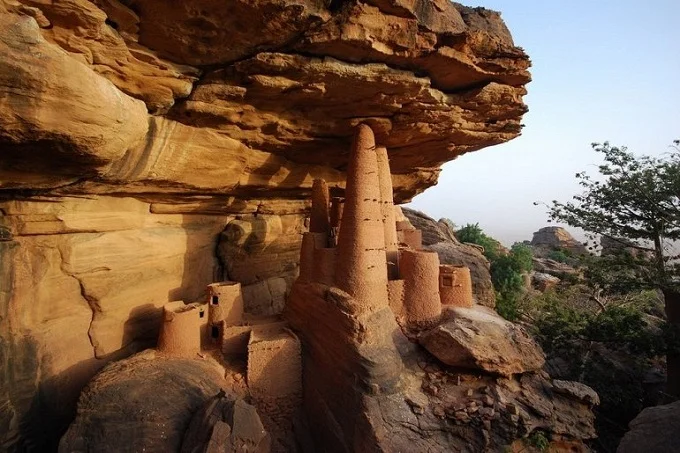The villages of Dogon in the Bandiagara Highlands. A rugged sandstone mountain rises in central Mali, roughly 90 kilometers east of Mopti, and a high plateau crowns it with a stunning view of the sandy plains below.
The Bandiagara Highlands, also known as the ‘Exceptional Landscape of Cliffs and Sandy Plateaus,’ runs about 150 kilometers and is certified by UNESCO as “an outstanding landscape of cliffs and sandy plateaus.” Because of its geological and historic characteristics, as well as its ethnological value, Bandiagara is regarded as one of West Africa’s most spectacular sites.

People have lived in the highlands for at least 2,000 years. Bandiagara has been home to an ethnic group known as the Dogon for the last 500 years.
Nearby Islamic tribal groups often assaulted the Dogon before relocating to the region from their homeland, much to the southwest (present-day Burkina Faso and Ghana). Slavery was forced upon men, women, and children, and towns were destroyed.
The Dogon first arrived in the area in the 15th century, settling in the Bandiagara cliffs and using the natural shelter as a defense against prospective attackers. The “little red men,” the Tellem pygmy tribes, were already living on the hills when they arrived.
The Tellem constructed houses at the escarpment’s foot, with burial caverns dug deep into the rock. The Dogons were encouraged to think that the Tellem people could fly because of the caverns’ high elevation.
The Dogons and the Tellem shared the refuge at first, but the indigenous peoples were eventually expelled, and the Tellem vanished. They are assumed to have either merged into the Dogon culture or relocated to Burkina Faso, which is close by.
Many of the surviving homes and structures, on the other hand, have survived the years and may still be seen in the region. The Dogon still employ several Tellem constructions, particularly granaries. Dogon county is one of the most famous exotic tourist sites.
The earliest Dogon colony was constructed in the Bandiagara Highlands’ extreme southwest corner. The Dogon migrated northward along the plateau and southeast to the Seno-Gondo Plain. The Dogon Land now covers more than 400,000 hectares and comprises almost 300 communities distributed along the Bandiagara Gorge’s length.
Their settlements are mainly found on the plateau at the top of the escarpment, or underneath the ancient Tellem constructions at the foot of the cliffs. Until the early 1930s, when a young French anthropologist called Marcel Griaule went on a fifteen-year study tour across West Africa, the Dogon were completely unknown in the West.
Mali now attracts a considerable number of visitors due to the Bandiagara mountains and Dogon culture.
